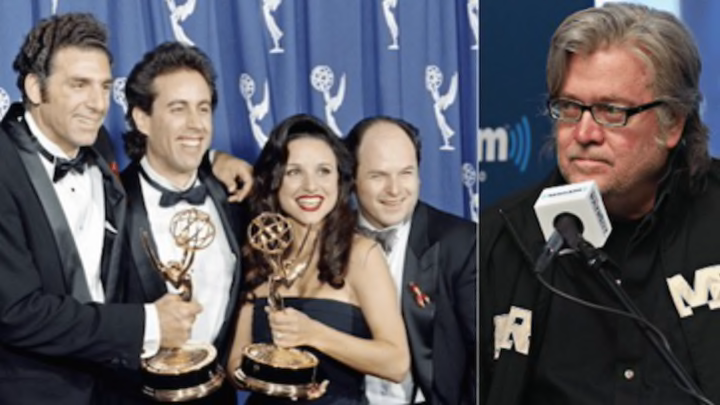Today, Steve Bannon is known as Donald Trump’s chief strategist and the controversial former executive chairman of Breitbart News. But in the early 1990s, the former investment banker was more likely to be found having power lunches at The Ivy than meeting with foreign dignitaries in the Oval Office. In 1992, he negotiated a financial stake in the syndication rights to Seinfeld, which was then just in its third season. It would prove to be a smart move.
In 1990, after logging some time at Goldman Sachs, Bannon and several colleagues decided to hang out their own shingle: Bannon & Co. was a boutique investment bank that specialized in media and took a unique approach to financing.
“At the time, investors preferred hard assets—manufacturing companies, real estate—and avoided things like movie studios and film libraries, which were harder to price,” wrote Joshua Green for Bloomberg. “Bannon’s group, drawing on data such as VHS cassette sales and TV ratings, devised a model to value intellectual property in the same way as tangible assets.”
“We got a ton of business,” Bannon told Bloomberg at the time.
Then Westinghouse Electric, a client of Bannon’s, came calling. Westinghouse owned Castle Rock Entertainment—a film and television production company co-founded by Rob Reiner—but was looking to sell. Bannon floated the idea of purchasing the company by Ted Turner, who was immediately intrigued. “Turner was going to build this huge studio, so we were negotiating the deal at the St. Regis hotel in New York,” Bannon told Bloomberg. “As often happened with Turner, when it came time to actually close the deal, Ted was short of cash … Westinghouse just wanted out. We told them, ‘You ought to take this deal. It’s a great deal.’ And they go, ‘If this is such a great deal, why don’t you defer some of your cash fee and keep an ownership stake in a package of TV rights?’”
It didn’t take long for Bannon to put his money where his mouth was, and end up owning a stake in five television series, including Seinfeld, which was then in its third season (and not yet the pop culture icon it would turn into). “We calculated what [Seinfeld] would get us if it made it to syndication,” Bannon said. “We were wrong by a factor of five.”
Though no one knows exactly how much cash Seinfeld reruns have earned Bannon, Forbes did its best to crunch the numbers last year. “It has been widely reported that the show has made $3.1 billion in deals in on-air syndication deals, which have been completed five times since the show’s finale in 1998,” Madeline Berg wrote. “On top of that, in 2015, Hulu paid $875,000 per episode—or about $160 million—for exclusive streaming rights for the show … If Bannon owned only a one percent share of the profits, he would have made about $32.6 million since 1998.” Serenity now!
